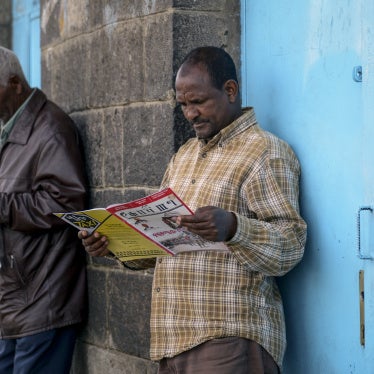The 50th-anniversary celebration of the Organisation of African Unity (OAU) and its successor, the African Union (AU), at the biannual heads-of-state summit next week is an important milestone. But, while they are celebrating, Africa's leaders should also do some serious reflection on why they haven't made sufficient progress on human rights.
The AU should use this gathering to call on its members to revisit their regional and international human rights obligations and adopt the mechanisms and reforms that those obligations require. That would give people across the continent a special reason to celebrate the anniversary.
Millions of Africans see few opportunities for democracy and cannot freely exercise their rights to freedom of expression, peaceful assembly and association. New or ongoing crises in Mali, Central African Republic, Sudan and South Sudan; ongoing conflict in the Democratic Republic of Congo (DRC); as well as longstanding repression in countries such as Ethiopia, Eritrea, Sudan, Swaziland, and Zimbabwe undermine progress towards respect for human rights and the rule of law.
Ten years ago, Africa's leaders made significant commitments to transparent and accountable governance and respect for human rights when they replaced the OAU with the AU and adopted the New Partnership for Africa's Development, a comprehensive economic and political reform programme. These new continental institutions and policy frameworks brought hope to the continent's citizens for human rights, democratic principles and good governance.
For the OAU, state sovereignty was paramount, with democracy and human rights on the backburner. The AU envisaged a more integrated approach that gave primacy to achieving peace and stability through democratic principles, good governance and human rights. Since then, the AU has often declared its support for human rights and democracy. At the 2011 heads-of-state summit, the AU declared "respect for human rights", "democratic governance" and "accountability" among the values shared across Africa. Unfortunately, such rhetoric has not translated into greater respect for human rights.
To its credit, the OAU-AU developed a wide body of legally binding instruments and has a strong human rights foundation in the African Charter on Human and Peoples' Rights. It has also shown strong support for good governance initiatives and democratic principles. But the extent to which these regional instruments have translated into concrete actions and far-reaching change is questionable. In the past year, we have seen flawed elections in Angola, unwarranted crackdowns on peaceful demonstrators in Angola, Zimbabwe and Sudan, and impunity for war crimes and crimes against humanity in the DRC and Sudan.
Displacement
Many African countries have growing and vibrant civil society organisations, but the hostile environment often faced by such groups shows up leaders' ambivalence about human rights. Civil society groups often have to work in highly limiting political spaces and face serious security risks. Monitoring of and reporting on human rights have been significantly constricted or entirely prevented in several countries, among them Angola, the DRC, Ethiopia, Eritrea, Sudan and Rwanda.
When it comes to peace and security, Africa has seen both improvements and challenges. Fighting between Sudanese government forces and rebel movements in Darfur, as well as in the South Kordofan and Blue Nile provinces over the past two years, has led to widespread abuses and the displacement of hundreds of thousands of people.
In Somalia, the transitional authority has given way to a new government, but the human rights situation remains poor. State security forces have been implicated in serious violations.
Elsewhere on the continent there has been backsliding on some of the positive trends of previous years. Northern Mali erupted in conflict and the Rwandan-backed rebel group, M23, has wreaked havoc in the eastern Congo.
The upcoming deployment of the Intervention Brigade – an African-led force within the UN peacekeeping mission in Congo, MONUSCO highlights the threat to peace and security and the need to end impunity in the Democratic Republic of Congo.
Impunity with regard to serious violations of international law has also brought into question African leaders' commitment to human rights. The AU has shown laudable commitment to justice in cases of genocide, war crimes and crimes against humanity. Yet the message has sometimes been mixed: some contend that the pursuit of justice would interfere with efforts to restore peace and security. The temptation to sacrifice accountability for peace is understandable but a culture of impunity has a high cost.
The AU has the potential to be a strong proponent of human rights. Its leaders need to find ways to build on the positive aspects of human-rights institutions and developments to cement a deeper human-rights culture. The anniversary should be more than an affirmation of how far the OAU-AU has come; it should also be a vision of how far the AU wants to go to achieve respect for universal human rights in Africa.
Tiseke Kasambala is the Africa advocacy director at Human Rights Watch, based in Johannesburg








